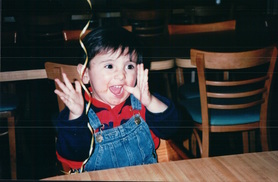
Our experience began on a summer afternoon when our son, Alex, was three years old. Out of the blue, something called Duchenne Muscular Dystrophy entered our lives and sent us headlong down unknown roads, some twisting, some straight, all unfamiliar. In an instant, my lifelong dreams of little league practices and games, water parks and roller coasters, and high school or collegiate sports slipped away. Dreams of teaching my son how to drive, vacationing at the beach, and hiking wilderness trails vanished. Just like that. The day simultaneously broke our hearts and gutted our dreams, and our journey was just beginning.
Recalculating…
The moment was surreal at best. Kristy and I answered the call simultaneously on different phones – she upstairs, me down. On the line was a Cincinnati Children’s Hospital neurologist. After early pleasantries and other small talk, we settled into the purpose of the call. We sensed something amiss and sorrow in her voice. We then listened in shock as she described our son’s condition. We were speechless. This cannot be happening. We’re dreaming, right?
We had taken Alex to Cincinnati Children’s Hospital for neurological testing because he was clearly behind in gross motor skills development. While his friends ran about, Alex struggled to keep up. He waddled, tripped, and fell…a lot. He could not climb stairs without extreme effort. He could not rise from the floor without pushing off his knee. Something was clearly not right. Kristy saw it first. Or at least she was the first to verbalize his struggles. I saw it, too, but rationalized that Alex was just behind the curve because of his Romanian birth. He would come around, I told her and convinced myself. Be patient. Just look at those calves! They’re so big and strong! (note: enlarged calves are a telltale sign of Duchenne. However, it's not muscle that makes the calf so large, it's amassed fatty tissue from the wasting of muscle). Regardless, I was convinced Alex would be a scrapping football player someday, or a wrestler, or even a soccer player. Heck, I didn’t care. I was just excited to fulfill a dream like my Dad did, and his Dad before him.
“Your son has Duchenne Muscular Dystrophy,” the neurologist bluntly told us after a heavy sigh. The conversation then fell silent, as we didn't know what to say. I oddly remember thinking. So! Everybody has SOMETHING. Duchenne Muscular Dystrophy? Pfft! No big deal, we can handle this. I had no clue of the seriousness of Duchenne. I had no clue of the devastating affect this disease would have on our son and our family. My mind was in full bring-it-on mentality. We would help him to get better, and then life would go on as planned, along the course we had charted. Kristy, always the more intuitive and pragmatic half, was direct and clear-cut with her response. “Are you saying that Alex will lose the ability to walk?”
Oh, come on, dear. Walking. It’s no big deal. We can handle this. What’s for dinner?
“Are you saying that Alex will lose strength in every muscle of his body including his lungs and heart? Are you saying that Alex will…” While she fell silent, I grew impatient.
Kristy, why so many questions?
“That’s exactly what I am saying, Mrs. Click. Alex is lacking Exons 41-52, the absence of which is characteristic of a child with DMD. His body cannot produce the dystrophin gene, the genetic glue that repairs muscle fibers when they tear and necessary for muscle strength. His condition will continue to worsen… ”
DMD? Glue? Doesn’t that seem a little callous? I still processed the information with confidence that everything would be fine. I barely remember the neurologist’s description of the horrible disease that affects about 1 in 3500 boys, a disease brought to light by Jerry Lewis each Labor Day weekend. Although I remained stuck on an acronym and glue, my brain subconsciously processed the news was not good. Seriously, not good. I knew that I should say something. I was the man of the family for goodness sakes, the rock, so to speak.
“Mr. Click, do you have any questions?”
“Uhh, no. None that I can think of at the moment.”
“Mrs. Click?” Silence again filled the connection. Kristy was too distraught to respond.
Time for me to step in, to take charge. “Thank you, doctor.” I then remember thinking, Thank you? That seems like an odd response. What, thanks so much for giving us such terrible news on this fine day? “Thank you, I guess we’ll be in touch.”
The day was July 5th. The neurologist told us on the phone she knew the results a couple of days prior, but she did not want to ruin our Independence Day holiday. Ironically, independence would slowly and surely become a foreign word to Alex and our family. His needs, and our lives, were forever changed. We were in shock. How could this be? Why us? Were we prepared? Was it fair? None of it mattered at the moment. DMD had staked its claim.
Welcome to Duchenne.
Recalculating….
 RSS Feed
RSS Feed